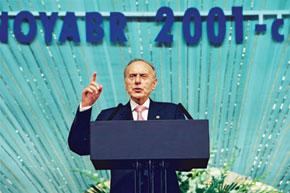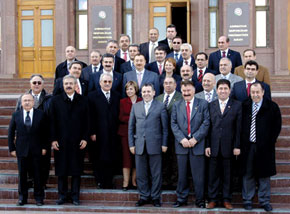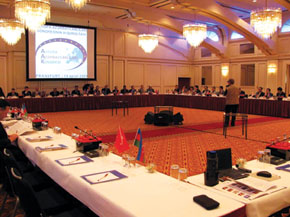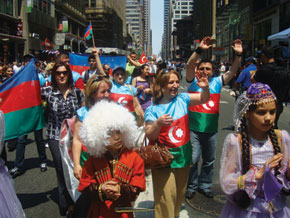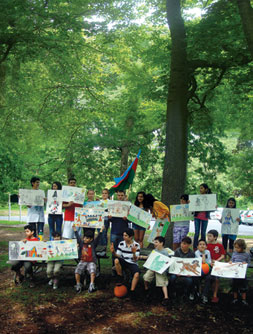 Diaspora children with their drawings, preparing for Azerbaijan Republic Day, Long Island, New York, 22 May 2010
Diaspora children with their drawings, preparing for Azerbaijan Republic Day, Long Island, New York, 22 May 2010 by Gulzar Novruzova
As Azerbaijan developed and strengthened its independent status, it also looked to its foreign policy and to restoring links with compatriots living abroad; it declared itself the guarantor of the interests of the world’s Azerbaijanis.
While Heydar Aliyev was still chairman of the Ali Mejlis (Supreme Assembly) of the Republic of Nakhchivan he took the lead in establishing World Azerbaijanis` Solidarity Day. The holiday was given state status. At the end of 1999 Heydar Aliyev, by now President of the Republic of Azerbaijan, addressed the world’s Azerbaijanis and noted: “The celebration of World Azerbaijanis` Solidarity Day on 31 December as a state holiday is the logical outcome of our people’s struggle for national-liberation and is already a fine tradition. This day of solidarity reflects the revival, progress and national unity of the Azerbaijani people, with their ancient and rich history and, in mobilising them to the sacred and responsible struggle for national statehood, it is a day of belief and hope for every Azerbaijani.... The international solidarity of Azerbaijanis assumes ever greater meaning and significance on the threshold of the 21st century. The major successes achieved in all areas of state building in our country since independence, open up ample opportunities for Azerbaijan to assume an honourable position within the world community and at the same time allow the world’s Azerbaijanis to exercise their national and international rights. To build on our successes we should rally more closely to our independent state, which embodies the state symbols of Azerbaijan and do our utmost to ensure its progress”1.
The Azerbaijani diaspora has gone through a developmental phase. In comparison with classical diasporas such as the Jewish and Greek ones, that of the Azerbaijani is quite young. It develops as a result of compatriots coming together in organizational structures (expatriates’ communities, societies, national-cultural associations) to preserve their national-cultural origins, language and the nation’s spiritual legacy. Since Azerbaijan’s declaration of independence, organisation of the diaspora has been taken under the state’s wing.
The mission
Heydar Aliyev set the priorities for governmental relations with the diaspora at the 1st congress of World Azerbaijanis “Irrespective of place of residence, everyone should think of the homeland. This is independent Azerbaijan. Therefore, irrespective of where you are, in what country you live, you should always think of Azerbaijan, about the independence of Azerbaijan, its territorial integrity, the present and the future of the Azerbaijani nation.”2
The main law regulating relations between the Republic of Azerbaijan and its expatriates is The Law of the Republic of Azerbaijan on state policy connected with Azerbaijanis living abroad, dated 27 December 2002.3
The activities of the Azerbaijani diaspora are directed towards developing civilised dialogue between the Republic of Azerbaijan and the countries in which Azerbaijanis reside; they include the following:
- Preservation of ethnic origin, development of awareness of Azerbaijani roots and patriotism, and promotion of love for the historical homeland, the Azerbaijani language and culture in rising generations;
- Generation of a united ethnic and cultural space for the young Azerbaijani diaspora;
- Formation of an elite among the Azerbaijani diaspora;
- Cooperation with official state structures at various levels, the legal regulation of migration issues;
- Integration of Azerbaijanis into the society of their country of residence, participation in the country’s social and political life, lobbying for the interests of the Republic of Azerbaijan abroad;
- Formation of ethnic journalism and mass media in the country of residence, generating public awareness of Azerbaijan, its history, ancient culture, its current geopolitical position and the Armenian-Azerbaijani, Nagorno-Karabagh conflict etc;
- Organising activities of All-Azerbaijani significance, such as Memorial Day for the victims of 20 January and 31 March, the Day of Azerbaijani Genocide, devoted to the victims of Baku and Khojaly;
- Establishment of relations with Turkish and Jewish diasporas in the country of residence.
All creeds and callings
The Azerbaijani Diaspora within the Russian Federation is the most numerous. This is related not only to the immediate proximity of the two countries, but also to historical relations going back more than two centuries. Azerbaijanis living in the Russian Federation are united in the new organizational structure, Diaspora. Large Azerbaijani diaspora organisations have been registered at the Ministry of Justice of the Russian Federation. At federal level, Azerbaijanis in Russia have founded the All-Russia Azerbaijan Congress (AAC), the Federal National and Cultural Autonomy of Azerbaijanis in Russia (FNCA AZERROS), the Expatriates’ community of Azerbaijanis in Russia, the Moscow-based cultural and educational society Ojag (Hearth) etc. Each of these organisations has regional branches. For example, the AAC is represented in 68 regions of the Russian Federation.
The founders of the Azerbaijan Diaspora in the Russian Federation are eminent Azerbaijanis. Their names are known throughout the post-Soviet area:
M.J. Aliyev, Honoured Science Worker, Honoured Doctor of the Russian Federation, Director of the Scientific Research Institute of Children’s Oncology and Haematology, Professor, President of the All-Russia Azerbaijan Congress (AAC);
V.Alekperov, President of the “LUKoil” oil company, First Vice- President of the AAC; A.I.Agalarov, President of “Crocus International”, Vice-President of the AAC;
F.T.Ahmedov, co-owner and member of the board of directors of “Nortgas” Joint-Stock Company, Vice-President of the AAC;
S.K.Sadikhov, Chairman of FNCA AZERROS;
A.A.Iskenderov, Editor-in-chief of the magazine “Questions of History”; G.M.Imanov, Rector of the Smolniy University of St.Petersburg, Academician of the Petrovsky Academy of Sciences;
Z.Gojayev, Academician of the Academy of Quality Issues of the Russian Federation, Chairman of the Presidium of the Congress of National Associations of Russia;
T.D.Melikov, Professor, orientalist, Chairman of the Ojag Azerbaijani cultural society;
R.Ibrahimbeyov, well-known film director; R.Arifjanov, renowned journalist
.... and many others.
An important factor consolidating the Azerbaijan diaspora is the participation of persons of different nationalities and faiths who formerly lived in Azerbaijan.
Active members of the Azerbaijan Diaspora of the Russian Federation include:
M.S.Gusman, Assistant to the Director General of ITAR-TASSVice-President of the AAC;
V.I.Igonin, President of the Lawyers Guild of Russia, Vice-President of the AAC;
J.Gusman. film director .... and others4.
The Azerbaijani diaspora is also widely represented in Europe; not only by Azerbaijanis from the Republic of Azerbaijan but also by those from Turkey and Iran. Jews from Azerbaijan who are equally concerned with the problems faced by the Azerbaijani diaspora are also active (for example, the Azerbaijani House created by Jews in Germany).
The first wave – to Europe...
The first wave of migrants moved from Azerbaijan to Europe and America in the 1920s. Members of the government and employees of the diplomatic service, students trained in European universities, experts sent to Europe, religious figures, members of the families of Baku’s magnates and others left their native land after the collapse of the Azerbaijan Democratic Republic (ADR) and the establishment of Soviet power in Azerbaijan.
The young government of the ADR had sent about 100 students to the best European universities to get a higher education in various fields. This was at the expense of the Azerbaijan state. Thus, there were 20 Azerbaijani students in France and also 20 in Germany5.
The first beginnings of an Azerbaijani community were established in Paris. Employees of the diplomatic mission, led by Alimardan bey Topchubashov, participating in the Versailles conference were the first among them. The Association of Azerbaijani Emigrants headed by Topchubashov and an expatriates’ community of students headed by D. Rahimov were established in Paris. The “Azerbaijan magazine” was first published in 1926.
By the end of the 20th century and the beginning of the 21st century, the Azerbaijani Diaspora of France had increased in number and spread. There are now more than 15 organisations.
A small group of Azerbaijanis settled in Germany in the 1920s and 30s. They were defectors and people who had managed to leave the USSR prior to the beginning of the Second World War. Fascist Germany formed special military divisions and legions consisting of Soviet as well as Azerbaijani prisoners of war.
Stalin’s reprisals frightened the Azerbaijanis in the concentration camps. Most of them remained in Germany.
In the late 1980s and early 1990s, Azerbaijanis who left their country due to Soviet disintegration and economic ruin migrated to Germany. In Germany as well as in France there are second and even third generation Azerbaijanis whose families have been there since the beginning of the 20th century.
The Azerbaijani Diaspora of Germany is significant and is represented in many regions. There are more than 25 organisations in all. There are 9 in Berlin alone. Smaller cities like Koblenz and Kelsterbach also have diaspora organisations.
...and to the USA
First wave emigrants went to the United States of America, too. Among them was the Minister of National Security of the ADR, Nagibey Sheykhzamanli. In 1956, Salahbey Sheykhzamanli organised the Azerbaijani Society of America (АSА). In 1957 the society was registered in the State of New Jersey. Since 1996 the АSА has been led by Nagibey Sheykhzamanli’s granddaughter, Tomriz Azeri. She has this to say about her work: “Our fathers and grandfathers created this society in the hope of handing down to us the Azerbaijani language, its culture and spirit, as well as nostalgia for the country. I remember my grandfather talking about Azerbaijan with great love. He would talk excitedly about the government, which was established before his eyes. He always told to us: “Don’t settle down forever anywhere else, we have a remarkable country, some day all of us will return and live there.”6
Heydar Aliyev in his speech to the first congress of World Azerbaijanis stressed: “Our task, the task of the Azerbaijan state, consists in displaying every possible care and attention for Azerbaijanis living worldwide. We should inquire about their lives and achieve further developments in relations between our state and the Azerbaijan communities in different countries. The Azerbaijanis living outside their country today should communicate more closely with independent Azerbaijan. These are the major conditions for ensuring the unity and solidarity of World Azerbaijanis (2. с.22).
The First Congress of World Azerbaijanis introduced and drew together foreign Azerbaijanis as a whole and individually. Thus they can now declare with confidence “I am a citizen of Azerbaijan!” Our great holiday, World Azerbaijanis Solidarity Day is the best confirmation of this.
Yes, there is a word for CITIZEN (VETENDASH – veten means native land and dash means stone) in the Azerbaijan language. In English it is citizen, in French it is citoyen, in German bürger etc. However, none of the world’s languages has a word like VETENDASH meaning stone of the native land. About the author: Gulzar Novruzova is a PhD in history, a scientific employee of the “World Azerbaijanis” branch of Baku State University. She has written a number of articles on the history of the Azerbaijani Diaspora.
Literature
1. Address by President Heydar Aliyev of the Republic of Azerbaijan, on the occasion of World Azerbaijanis Solidarity Day - Baku, 28 December 1999
2. Speech by President Heydar Aliyev of the Republic of Azerbaijan, p. 21-24. Congress World Azerbaijanis (9-10 November 2001) p. 351, Azerneshr, Baku, 2002
3. The Law of the Republic of Azerbaijan on State Policy on Azerbaijanis Living Abroad, 413-II G. 27 December 2002
4. G.T.Novruzova. The Azerbaijani Diaspora of the Russian Federation: problems of historical demography (1989-2002). Author’s abstract, PhD thesis in historical sciences, 7 January 2002. Baku, 2010.
5. M.Jafarli. Political terror and the destinies of Azerbaijani Germans, p.120. Istanbul-1998. Second edition, p. 319. Baku 2003.
6. Far and near America. www. Press-d.az.
